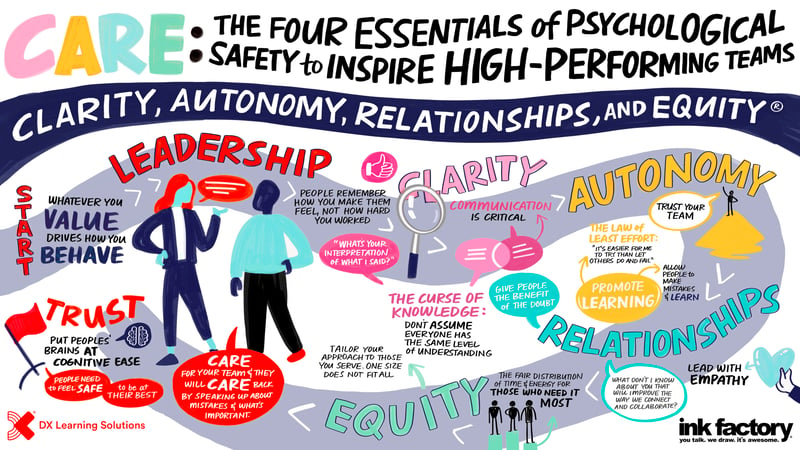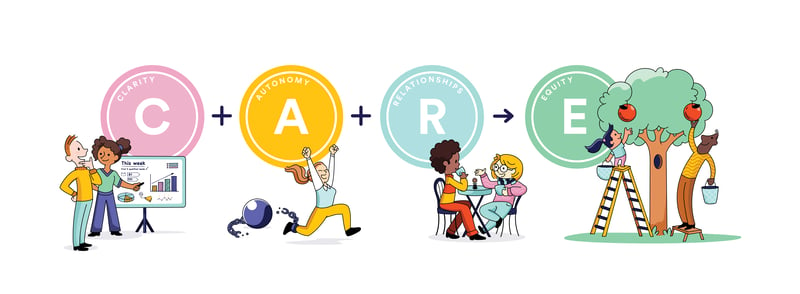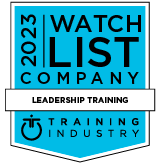What is Psychological Safety Training?

A psychologically safe workspace is an environment where every member of a team feels they can be genuine and honest, and share feedback that they know will be well-received, even if it’s uncomfortable to hear.
Imagine a team where everyone consistently vocalizes:
• What's working, so we can amplify those efforts.
• What's not working, so we can minimize or improve those aspects.
This is the definition of high performance—achieving top-tier results while also fostering the well-being of each team member.
The term “psychological safety” was made mainstream by Harvard organizational behavioral scientist Amy Edmondson. Edmondson defines psychological safety at work as “a shared belief held by members of a team that the team is safe for interpersonal risk-taking.”
Now, voicing what matters to you in front of your team may seem straightforward. But in practice, it's far from easy. Fear of appearing uninformed, or worse, incompetent, can be overwhelming. However, it's usually an unfounded fear instilled by our minds, pushing us towards silence. It seems easier to continue without seeking the clarification you need, to avoid the perceived risk.
DX Learning’s Psychological Safety Training aims to build a high-performing culture, through a top-down and bottom approach where we:
- Equip leaders at all levels with the essential skills needed to foster an environment where team members feel comfortable opening up.
- Train all team members on what a great culture looks like, so they have a vocabulary to inspire them to speak up and ask for what they are not getting.
The programs enhance employee confidence, resilience, and well-being, enabling individuals to give and receive feedback; to assertively say “no” when necessary, and to share crucial information and ideas without fear of judgment or retribution.
The attainment of psychological safety is contingent on a leader displaying the right behaviors to create the right conditions. This is a delicate balance—it’s challenging to build psychological safety, and it can quickly be lost without intentionality.
The principles of psychological safety work to diminish barriers to candid dialogue and freedom of speech. It instils employees with the confidence to speak up when needed.
As humans, we’re only as burdened as our secrets. It's vital we stop harboring these secrets and communicate openly with bosses and teams. Even when the truth hurts. This is the crucial difference between a kind team and a nice team.
Kindness equates to honesty, whereas niceness often involves telling people what they want to hear, instead of what they need to hear. A nice workplace might seem comfortable and polite, but this can breed silos, office politics, and guarded relationships.
Why Psychological Safety Training is Crucial for Culture
Creating psychological safety in a workplace takes an unusual and intentional degree of focus, effort, and skill. It’s natural for people to be reluctant to ask questions, hold back ideas, and be reticent about disagreeing with their boss.
But silence is a leadership and culture killer.
This stops the free exchange of new thinking, innovation, worries or important questions about work, far more often than most managers realize.
When a team member takes three days to complete a task you think should take just one day, it’s often because they don’t feel safe to ask the questions needed to improve a process or reach an outcome quicker.
To reverse this and build employee confidence, resilience, and well-being, is truly challenging. Especially, when there’s damage to be fixed, perhaps during change, merger, acquisition, or following a disruptive period, recession, or pandemic, for example!
It's a process of helping people develop new beliefs, habits, and behaviors. Something that’s neither easy nor natural. However, a psychologically safe workspace can have a dramatic impact on the culture of the team or workplace, productivity, and employee engagement. 
Enhances Employee Confidence
When people can express themselves without fear of judgment or retribution, it empowers them with peace of mind and confidence where openness, engagement, and vulnerability are welcomed. Employees no longer have to bring home their work-related stress and inflict it upon their families.
DX’s psychological safety leadership training program, which we call The CARE Experience® teaches leaders the soft inclusive leadership skills that lead to employee confidence and resilience. For example, by leading with vulnerability, so they can engage with their teams, and lead by example. You can’t ask of others what you’re not willing to do yourself. If you want your team to speak up, you need to be the first to speak up.
The most important lessons are not taught – they’re learned – and seeing your boss open up and ask for guidance, help, and support, or mentoring, can sometimes be the best lesson. We all have important thoughts to share; it becomes substantially easier to voice them when a leader consistently discusses their own mistakes, challenges, and struggles. They demonstrate that imperfections are an integral part of life, not something to be hidden.
Increases Transparency with Managers
Psychologically safe teams know they can trust their leaders to communicate the truth, and these are the teams that last. Transparency ensures all employees feel a sense of belonging and are aware of how the business is performing, as both financial and non-financial information is shared and discussed openly.
Transparent messaging from management inspires confidence and boosts productivity. People feel more psychologically safe too, which fosters trust and encourages them to share ideas. This cascades right through the organization.
Enables Truthful Feedback
Truthful feedback and radical candor are only possible when people are confident that the feedback is designed to help them learn and grow and isn’t personal. Truthful feedback will include the following key elements:
- Acknowledge the person with whom you’re talking is a human being.
- Speak as you would like to be spoken to and with the same respect you want for yourself.
- Set the expectation that disagreements will never be personal.
- Listen to the other person's perspective on an issue and take time to reflect on it.
- Learn to apologize and to forgive.
How CARE Inspires Managers to Create a Psychologically Safe Workplace
CARE: The Four Essentials of Psychological Safety to Inspire High Performing Teams
DX’s CARE leadership training programs are based on a 6-step methodology for accelerated behavior change, grounded in neuroscience. It focuses on four core elements of leadership and is designed specifically to help teams and organizations grow.
As such, it’s our signature program – the one that has been adopted by more organizations post-Covid, than any other DX program. Leaders are instrumental in creating a culture where people can speak up. They need to be inspired and taught how to do it effectively, consistently, and intentionally.
Why?
The world changed.
We may be a little bored with talking about the pandemic. But the reality is, that it’s accelerated trends that have been building slowly in the workplace for a long time.
These include the move towards remote and hybrid workforces; the rise of the portfolio career; and the increasing awareness of the need for inclusion and wellbeing initiatives to directly counter the additional pressure of ever-more demanding jobs and exhaustion, disengagement, and quitting. Equally, reliance on technologies; and skillsets that must be developed fast.
How The 4 Components of CARE Contribute to Psychological Safety
Clarity: Building a shared understanding of crystal-clear goals removes uncertainty in the team members. When leaders focus on clarity and open themselves up to discussion about the “whys” and “what’s” of those goals, that openness is a visible demonstration of vulnerability. Psychologically, this makes people feel more secure. Leaders need to eliminate assumptions from their teams, ensuring everyone is on the same page.
Autonomy: Trusting your team to do what needs to be done and on their terms. While micromanaging may be brushed off as an annoying, yet inevitably part of our work lives, it’s typically detrimental to psychological safety. When managers make even subtle tweaks to their empowering management approach and mindset, teams will feel trusted and supported. This helps them feel freer to, not just voice their opinions, but to be more creative —and the benefits will go both ways. We need leaders to act and think like coaches, not players.
Relationships: Connecting with people on a human level. Everyone is struggling with something in this world, the question is do your leaders know what that is?
Asking about their dog, their health, their social life, their hobbies, home, dreams, and desires, demonstrates a deeper level of connection. A trusting relationship between a leader and their employees creates authentic connections. When this is achieved, it provides team members with the knowledge that their back is covered and they feel confident enough to share concerns, give and receive support, or ask questions. To know is not to assume. We need to know what our team is struggling with.
Equity: Imagine three of your team members are at a zoo, trying to see penguins get fed. One is tall, one of average height, and the third is not tall at all. If you treat them equally, you’ll give them all a block to stand on, so they can see. If you treat them equally, they all get the same-sized block.
The tall person now feels awkward as they’re even taller. The small person still can’t see. Only the middle person feels OK. That trigger of unfairness rips a team apart.
If you treat them equitably, however, then the tallest person receives no block, the middle person has one, and the shortest person has two blocks.
Equity allows everyone the opportunity to be the best version of themselves, contributing hugely towards a psychologically safe place of work.
Equity = the proportionate allocation of resources to those that need it the most. Fairness.
Clarity, Autonomy, Relationships and Equity®. The CARE equation is an effective strategy for fostering such a culture. It starts with crystal clear clarity about the purpose and goals, which then sets the stage for autonomy, allowing delegation of tasks and trusting the team to accomplish them. A balance of clarity and autonomy provides leaders with time, an often complained about scarcity. This time can then be invested in nurturing relationships. Knowing what makes each team member tick helps tailor the approach to the needs and preferences of each individual, rather than imposing a one-size-fits-all strategy.

This nuanced understanding and tailored approach are the key to fostering inclusion and, by extension, psychological safety within the team.
Find out how CARE has provided psychological safety training for DX client, The Oncology Institute here.
Insights

Subscribe to Our Monthly Newsletter!
For managers and talent professionals who truly believe in putting people first, the CARE to Win blog is your gateway to the latest insights on human-centric leadership. Join us as we champion the people first movement.
Need some time apart? Are we emailing you too often? Just give us your feedback, and we promise we’ll respond. We really do care. And if it’s still too much, just unsubscribe. It’s cool.
.jpg) Alex Draper
Alex Draper



